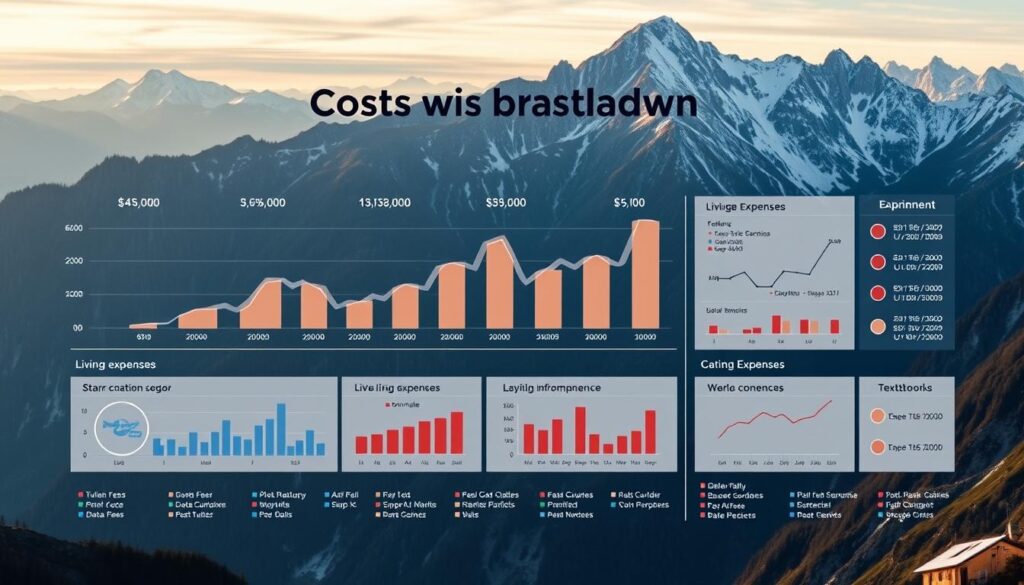Switzerland is one of the best destinations to study data science, offering a mix of rigorous computer science and applied statistics training plus strong industry links. This guide gives clear information on tuition, admissions, scholarships, and career support so you can compare programs and plan next steps.
Swiss programs combine technical modules—programming in Python/R, statistics, and machine learning—with project-based learning and industry internships. Whether your goal is machine learning research or business analytics, a Data Science Course in Switzerland can be a direct route to roles in tech, finance, healthcare, or research.
Many institutions also offer scholarships and funding that lower the overall cost and improve access for international students.
Key Takeaways
- Compare tuition ranges and payment plans for a Data Science Course in Switzerland (examples include ETH Zurich and EPFL).
- Understand admission requirements—academic background, language proof, and relevant project or work experience.
- Find scholarships and merit- or need-based aid to reduce costs and improve competitiveness.
- See how programs combine core technical modules with industry projects to build practical skills in data, models, and machine learning.
- Get quick answers to common questions—admissions, deadlines, and budgeting—so you can start your application with confidence.
Ready to compare programs or check scholarship options? Use the program comparison and scholarship finder in this guide to find the best fit for your data science study plans.
Introduction to Data Science Education in Switzerland
Data science sits at the intersection of statistics, computer science, and domain knowledge—powering advances in healthcare, finance, climate research, and more. In Switzerland, universities emphasize a balance of rigorous theory (mathematics and statistics) and hands-on learning (programming, data engineering, and applied machine learning) so graduates can apply data insights directly in industry.
Data Science’s Global Impact
- Predictive analytics help global companies such as Nestlé optimize supply chains and reduce waste.
- Machine learning models accelerate medical diagnostics and personalized treatments in healthcare settings.
- Banks and insurers rely on data-driven risk models to make faster, better-informed decisions.
Why Choose Switzerland?
Swiss universities are recognized for strong research, applied learning, and industry partnerships. Leading institutions—selected here for research output, industry ties, and graduate outcomes—offer students access to:
- A multilingual, international environment that prepares students for global careers.
- State-of-the-art research labs and computing infrastructure for AI and large-scale data analysis.
- Collaborations and internships with tech companies (e.g., Google Zurich), healthcare firms, and research centers.
“The mix of academic rigor and industry partnerships makes Swiss programs stand out.” – Dr. Lena Müller, ETH Zurich professor
Many graduates report stronger early-career salaries and faster placement than regional peers; for context, check national employment statistics and each university’s career outcomes when comparing programs.
Overview of Switzerland’s Leading Data Science Programs
This selection highlights programs chosen for strong research profiles, industry links, and practical learning—features that matter when you plan your data science learning pathway and career trajectory.
| University | Program Highlights | Faculty | Research | Networking | Data Science Program Switzerland fees |
|---|---|---|---|---|---|
| ETH Zurich | Machine learning, AI, big data analytics | Professionals from Google and IBM | Collaborations with CERN and tech startups | Access to tech meetups and internships | $30k–$45k annually |
| EPFL | Data engineering, healthcare analytics | Researchers in AI ethics | Projects with Philips and Roche | Global alumni network | $28k–$42k per year |
| University of Geneva | Big data visualization, climate data | CERN-affiliated experts | Climate change data research | EU-wide internships | $25k–$38k yearly |
“The hands-on projects at ETH Zurich prepared me for real-world challenges.” – Clara Müller, EPFL Alumna
These programs focus on lab work and partnerships with tech giants. Students get to work in labs and innovation hubs. For more on Data Science Program Switzerland fees, check the university websites. Look for programs that fit your career and budget.
Data Science Course in Switzerland tuition fees, requirements, scholarship
Choosing a Data Science program in Switzerland requires clear planning for both the program cost and the admission steps. Below you’ll find concrete examples of typical tuition structures, a breakdown of living expenses, and where to look for scholarships to reduce your total cost.
Detailed Tuition Structures
As an example of how program fees are structured: a typical 2-year Master’s programme at a Swiss technical university often lists annual tuition in the mid-range. For budgeting, think in terms of CHF per semester (many universities bill per semester) rather than a single lump sum.
Example: a 2-year Master’s with CHF 20,000 total tuition implies roughly CHF 5,000 per semester — use university pages to confirm exact semester fees and any additional enrollment or lab charges.
Admission Criteria Overview
- Bachelor’s degree in computer science, math, or statistics
- Minimum GPA of 3.0 on a 4.0 scale
- English proof via TOEFL (80+) or IELTS (6.5+)
Many institutions, like the University of Basel’s program, offer scholarships. These cover 10–50% of tuition based on merit or financial need. These opportunities help reduce barriers for qualified applicants.
Tuition Fees and Cost Breakdown
Understanding the Switzerland Data Science Course cost means looking at more than just tuition. You also need to consider living costs and hidden fees. Let’s dive into the details to help you plan better.
Breakdown of Tuition Fees
Tuition varies by level and institution. Typical ranges to expect (verify with each programme):
Bachelor’s programmes: CHF 2,000–10,000 annually (public universities typically at the lower end).
Master’s programmes: CHF 5,000–30,000 annually (depends on university and whether a program is industry-led).
- Bachelor’s programmes: CHF 2,000–10,000 annually (public universities typically at the lower end).
- Master’s programmes: CHF 5,000–30,000 annually (depends on university and whether a program is industry-led).
- PhD: often partially funded (stipends or assistantships reduce direct tuition costs).

Additional Costs and Financial Planning
In addition to tuition, plan for monthly living costs and one-time fees. Use this checklist to create your budget:
- Semester tuition deposit / enrollment fee
- Health insurance and visa-related costs
- Rent deposit (often one to three months’ rent)
- Monthly living (accommodation, food, transport) — estimate CHF 2,200–2,800 depending on city
Monthly example total
A reasonable monthly living estimate (excluding tuition) is CHF 2,170–2,800 — adjust this for your chosen city and lifestyle.
Scholarships can cover part or all of tuition and sometimes living costs. The Swiss Government Excellence Scholarships and many university-specific awards are worth investigating; award amounts and eligibility vary by programme.
For targeted guidance on scholarships and a downloadable budget template, use the scholarship finder and budgeting resource in this guide (see CTA links in the sidebar).
| Expense | Monthly Cost (CHF) |
|---|---|
| Accommodation | 1,500–2,000 |
| Food | 600–800 |
| Transportation | 70–100 |
| 2,170–2,800 CHF |
Start planning your finances by budgeting for these costs. Scholarships like the Swiss Government Excellence Scholarships can help. They cover tuition and living expenses. Look into universities like ETH Zurich or the University of Geneva for more aid.
For more on grants and loans, check out this guide. It offers tips on funding your studies.
Consider stipends and loans from banks to help out. Apply for scholarships or work-study programs early. Every step you take helps manage the Switzerland Data Science Course cost smoothly.
Admission Requirements for Aspiring Data Scientists
To apply for a Data Science Course in Switzerland, you should understand the baseline admission requirements and the elements that make a competitive application. Below are the typical minimums (what many programmes require) and recommended items you should include to stand out.
Academic & professional qualifications (minimum vs recommended)
Most programmes expect a strong quantitative background. Use the checklist below to map your profile to admission requirements.
- Minimum required: Recognized bachelor’s degree in STEM fields — computer science, mathematics, statistics, engineering, or equivalent.
- Typical academic standard: Competitive GPA (many programs target ~3.0/4.0 or higher — check the specific programme).
- Recommended: Practical experience in analytics, data analysis, internships, or relevant work; projects that demonstrate applied skills (GitHub repos, Kaggle, thesis).
- Foundational knowledge in statistics, linear algebra, and programming (Python or R) is expected; some programmes explicitly list required modules—compare the programme content before applying.
Language proficiency (how to meet requirements)
Many programmes are taught in English and ask for proof of proficiency. Typical acceptable scores (check each university for exact cutoffs):
Common benchmarks: IELTS 6.5+ or TOEFL iBT ~90+ (some programmes set higher thresholds — verify the programme page). A C1-level Cambridge certificate is also commonly accepted.
“Language skills ensure seamless participation in lectures and collaborative projects,” emphasizes the Swiss Federal Institute of Technology’s admissions team.
Get ready with your transcripts, letters of recommendation, and a statement of purpose. This explains your career goals. Meeting these Data Science Course requirements Switzerland makes your application stronger in this competitive field.
Scholarship Opportunities for Data Science Courses
Scholarships reduce the financial barrier to studying data science. Below are common types and practical next steps when applying.
| Scholarship Type | Eligibility | Typical Awards |
|---|---|---|
| Mechit-Based | High academic achievements | CHF 10,000–20,000 |
| Need-Based | Financial need documentation | CHF 5,000–15,000 |
Merit-Based Scholarships
Top students get merit-based awards. These go to those who excel academically, show great research skills, or are skilled in coding. Schools look at grades and projects to find the right candidates.
Need-Based Financial Aid
Students who need help financially can apply for need-based aid. They must show proof of their income to qualify. This aid is to make sure everyone can get an education.
Application tips (quick checklist)
- Highlight project work: link to code, notebooks, or deployments (GitHub, Kaggle, REPO).
- Submit transcripts, CV, two recommendation letters, and a focused statement of purpose describing relevant experience and goals.
- Attend virtual info sessions and contact admissions early if your background is non-standard — institutions often offer guidance on bridging courses or conditional offers.
Tip: prepare a one-page “application snapshot” listing your technical skills, projects, and links — it makes reviewing easier for admissions and scholarship panels.
Comparing Data Science Course Tuition Fees Across Institutions
When choosing a Data Science programme, price is one factor — but consider programme content, modules, and career outcomes alongside tuition. Below is a compact comparison of representative Swiss programmes to help you weigh cost versus curriculum focus and duration.
| Institution | Annual Tuition (CHF) | Program Length (Years) | Key Focus Areas |
|---|---|---|---|
| ETH Zurich | 16,000 CHF | 2 | Machine Learning, AI Research |
| EPFL | 15,000 CHF | 1.5 | Big Data Engineering |
| University of Geneva | 10,000 CHF | 2 | Healthcare Analytics |
| University of Lausanne | 12,000 CHF | 1.5 | Business Analytics |
Tuition reflects programme duration and intensity — shorter, intensive programmes may have lower total cost but higher per-semester fees. When comparing, map the programme content and modules (core vs elective), expected credits/ECTS, and industry links rather than choosing on price alone.
- Check programme modules: typical core modules include programming (Python/R), probability and statistics, machine learning models, and data engineering.
- Consider ECTS or credit load per semester to estimate workload and compare duration and cost per credit.
If you want, use the programme comparison checklist in this guide to score each option by tuition, modules, industry projects, and networking — then prioritize programmes that match your career goals and budget.
“My specialization in sustainable AI helped me land a role optimizing renewable energy grids—this is where the job market is booming.” – Lena Müller, EPFL Alumna
Programs like the University of Geneva’s Big Data specialization partner with CERN. They offer projects analyzing particle physics datasets. This hands-on approach ensures graduates are job-ready for sectors from finance to environmental science.
Career Prospects After Earning a Data Science Degree in Switzerland
A degree in data science from a Swiss university prepares you for a strong job market where employers value practical analysis skills, machine learning knowledge, and experience working on real datasets. Swiss programs emphasize applied projects and industry collaboration, which helps graduates move quickly into roles in tech, finance, healthcare, and engineering.
Job Market Trends
Finance, healthcare, e-commerce, and engineering are major employers of data science graduates. Large Swiss and multinational firms — Google Zurich, Roche, UBS among them — actively recruit candidates with strong technical skills and industry experience. Check recent labor reports and university career pages for current growth figures in data roles.
Salary Expectations
Salaries vary by role, experience, and sector. Below are representative ranges to help you plan (verify with current salary surveys and campus career services):
| Job Title | CHF (Annual) | USD Equivalent |
|---|---|---|
| Data Scientist | 90,000-120,000 | $92,000-$123,000 |
| AI Engineer | 110,000-150,000 | $113,000-$154,000 |
| Business Analyst | 75,000-100,000 | $77,000-$102,000 |
Remember: compensation depends on company size, role, technical depth, and your previous work or research experience. Use university career reports and national salary surveys as reference points for up-to-date figures.
Campus Life and Student Support Services in Switzerland
Beyond classes, Swiss universities provide infrastructure and services that help students transition into the workforce: modern labs, coding workshops, career fairs, and mentorship programmes pairing students with industry professionals.
Campus Facilities and Resources
Top schools like ETH Zurich and EPFL have labs, libraries, and tech centers. These spaces let students work on projects or study in comfort. Many campuses also have:
- 24/7 computer labs with data analysis software
- Learning centers for coding workshops
- Social areas for group projects
Student Mentorship Programs
Universities connect newcomers with mentors. These programs pair students with industry pros or alumni. Here’s what they offer:
| Program | Focus | Benefits |
|---|---|---|
| Peer Mentorship | Academic guidance | Weekly check-ins |
| Industry Mentors | Professional growth | Networking events |
| International Buddy | Cultural adjustment | Language support |
“My mentor helped me land an internship. The campus career fairs also opened doors I didn’t expect.” – Maria, EPFL graduate
Switzerland’s data science programs also host tech clubs, coding competitions, and career fairs. These activities build skills beyond the classroom. From study spaces to mentor-led events, every resource aims to help students thrive.
Application Process and Timelines for Data Science Courses
Starting an application for a Data Science program in Switzerland means matching your profile to each programme’s eligibility and following a clear timeline. Below is a practical, step-by-step guide plus key deadlines so you can plan your application, tests, and registrations without surprises.
Step-by-Step Application Guide
- Map eligibility: check programme pages for academic requirements, required modules (math, statistics, computer science), and language proof.
- Prepare documents: transcripts (translated if needed), CV, two letters of recommendation, statement of purpose, and links to code/projects.
- Book and complete language tests (IELTS/TOEFL) and any required entrance exams well before deadlines—allow 6–8 weeks for score reporting.
- Submit the online application through the university portal and pay the registration fee (if applicable).
- Prepare for interviews: some programmes request short interviews or additional assessments; practice explaining your projects and technical decisions.
Important Deadlines
- T-minus 12 months: Research programmes, note application requirements and deadlines, and start preparing for language or entrance tests.
- T-minus 6 months: Take language tests if needed, request transcripts and LORs, and draft your statement of purpose.
- Application window: Final deadlines vary by institution — many programmes with fall intake have deadlines between January and April; some competitive or funded tracks close in January (always verify the programme page).
- Decision period: Expect offers or rejections in 4–12 weeks after submission depending on the programme.
“Double-check every document before submitting—it’s better to be thorough than to miss a deadline,” advises ETH Zurich admissions staff.
Practical tips: request LORs at least 6 weeks before the submission date, register for standardized tests early, and keep a personal timeline with test dates, registration, and document deadlines. If you have questions about a programme’s requirements, contact the admissions office—most universities provide direct contact details on the application page.
Success Stories and Alumni Experiences from Switzerland
Alumni are one of the best signals of a programme’s value. Graduates from Swiss data science programmes often move into high-impact roles across tech, finance, healthcare, and startups — frequently citing project-based learning and industry partnerships as key to their success. When evaluating programmes, review alumni outcomes and placement reports on university pages.

“The real-world datasets and mentorship from industry experts gave me confidence to innovate. My thesis project became the foundation for a startup now valued at $5M.”
- Career outcomes: Alumni hold roles at Google Zurich, Roche, UBS and leading fintech and healthcare organizations, often in data scientist, ML engineer, or analytics lead positions.
- Global networks: Many graduates join international projects and collaborations thanks to Switzerland’s research and industry links.
- Entrepreneurial impact: Several alumni have launched startups in fintech, sustainability, and health tech — often scaling via partnerships with academic labs.
These examples show how Swiss programmes connect data science learning with real-world work and networks. If you want similar outcomes, prioritize programmes that include industry projects, strong mentorship, and active career services.
Conclusion
Data science programmes in Switzerland offer a strong mix of academic rigor, practical modules, and industry connections that prepare students for careers in AI, analytics, and research. When comparing options, weigh tuition against programme content, modules, industry ties, and alumni outcomes to find the best fit for your career goals.
Need help narrowing choices? Use the comparison checklist and scholarship finder in this guide or book a short advising call to review programme fit and application strategy.
Ready to move forward? Look at admission needs or apply for scholarships. Choosing to study data science in Switzerland could lead to a rewarding career in tech and analytics.

Kadamb Overseas Private Limited, headquartered in Ahmedabad, is a prominent organisation offering top-tier academic career counseling and consultancy services for students aspiring to Best Study abroad Consultant in Ahmedabad, India. With a team of skilled professionals, we provide guidance throughout the admission process and offer additional services like student visa support, travel arrangements, accommodation, and financial aid counseling
Tuition fees for Data Science courses in Switzerland vary. They range from CHF 15,000 to CHF 40,000 per year. Check specific universities for exact figures.
You need a bachelor’s degree in a related field like computer science or mathematics. Some programs also consider professional experience or technical skills.
Yes, there are scholarships available. They include merit-based and need-based financial aid for both international and local students.
Costs include tuition fees and living expenses. Living costs can be CHF 1,200 to CHF 2,500 monthly, depending on the city.
Most Data Science programs are in English. But, some may offer classes in German or French. Always check the language before applying.
You need a recognized bachelor’s degree. Some universities may also require GRE or GMAT scores.
Apply for scholarships with your course application. You’ll need to submit academic transcripts, a personal statement, and letters of recommendation.
Eligibility depends on the scholarship. It usually includes academic achievement, financial need, and sometimes achievements in related fields.
Deadlines vary by institution. Many universities have deadlines from January to April for September intake. Check specific dates with the university.
Graduates have a strong job market in Switzerland. They can work in finance, healthcare, and technology. Expect competitive salaries and career growth.


